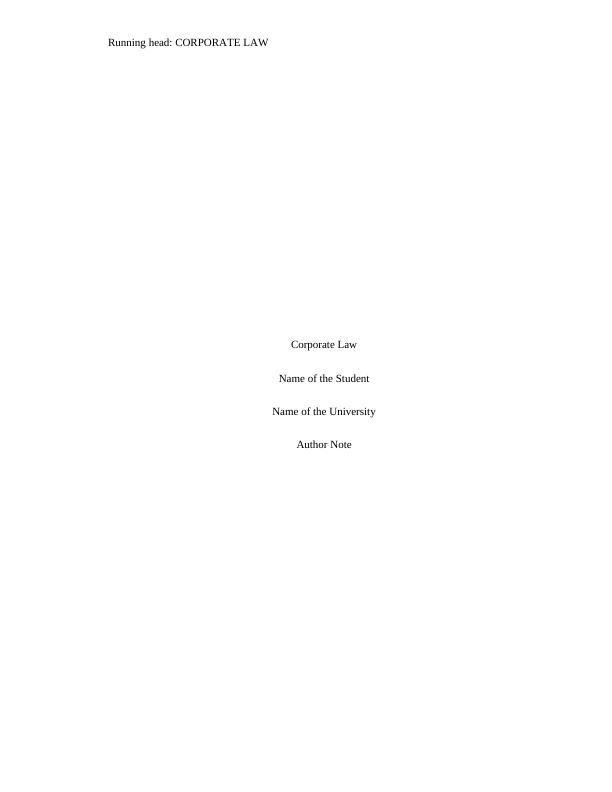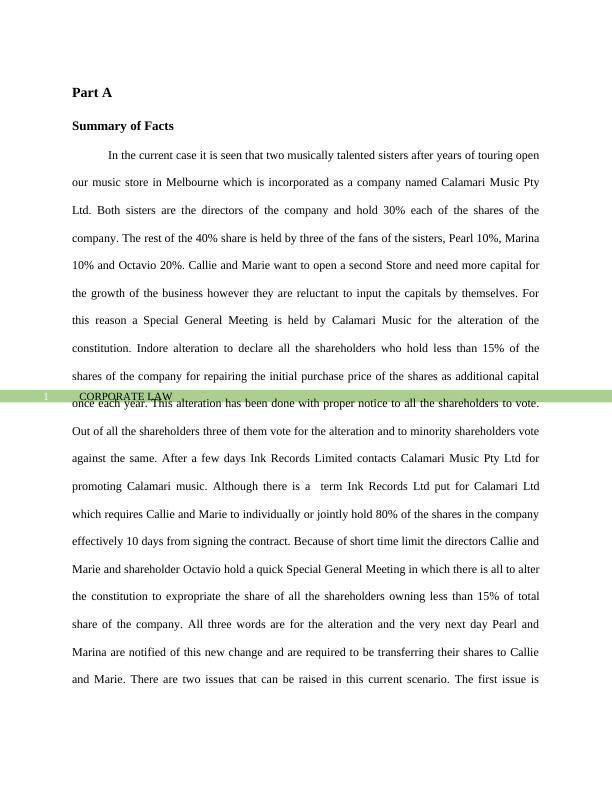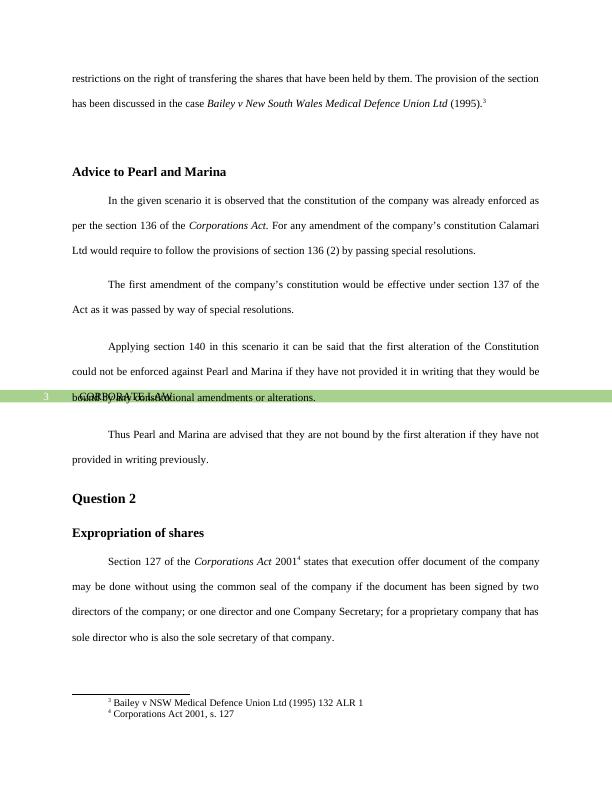Corporate Law
Added on 2022-11-17
11 Pages2974 Words300 Views
Running head: CORPORATE LAW
Corporate Law
Name of the Student
Name of the University
Author Note
Corporate Law
Name of the Student
Name of the University
Author Note

CORPORATE LAW1
Part A
Summary of Facts
In the current case it is seen that two musically talented sisters after years of touring open
our music store in Melbourne which is incorporated as a company named Calamari Music Pty
Ltd. Both sisters are the directors of the company and hold 30% each of the shares of the
company. The rest of the 40% share is held by three of the fans of the sisters, Pearl 10%, Marina
10% and Octavio 20%. Callie and Marie want to open a second Store and need more capital for
the growth of the business however they are reluctant to input the capitals by themselves. For
this reason a Special General Meeting is held by Calamari Music for the alteration of the
constitution. Indore alteration to declare all the shareholders who hold less than 15% of the
shares of the company for repairing the initial purchase price of the shares as additional capital
once each year. This alteration has been done with proper notice to all the shareholders to vote.
Out of all the shareholders three of them vote for the alteration and to minority shareholders vote
against the same. After a few days Ink Records Limited contacts Calamari Music Pty Ltd for
promoting Calamari music. Although there is a term Ink Records Ltd put for Calamari Ltd
which requires Callie and Marie to individually or jointly hold 80% of the shares in the company
effectively 10 days from signing the contract. Because of short time limit the directors Callie and
Marie and shareholder Octavio hold a quick Special General Meeting in which there is all to alter
the constitution to expropriate the share of all the shareholders owning less than 15% of total
share of the company. All three words are for the alteration and the very next day Pearl and
Marina are notified of this new change and are required to be transferring their shares to Callie
and Marie. There are two issues that can be raised in this current scenario. The first issue is
Part A
Summary of Facts
In the current case it is seen that two musically talented sisters after years of touring open
our music store in Melbourne which is incorporated as a company named Calamari Music Pty
Ltd. Both sisters are the directors of the company and hold 30% each of the shares of the
company. The rest of the 40% share is held by three of the fans of the sisters, Pearl 10%, Marina
10% and Octavio 20%. Callie and Marie want to open a second Store and need more capital for
the growth of the business however they are reluctant to input the capitals by themselves. For
this reason a Special General Meeting is held by Calamari Music for the alteration of the
constitution. Indore alteration to declare all the shareholders who hold less than 15% of the
shares of the company for repairing the initial purchase price of the shares as additional capital
once each year. This alteration has been done with proper notice to all the shareholders to vote.
Out of all the shareholders three of them vote for the alteration and to minority shareholders vote
against the same. After a few days Ink Records Limited contacts Calamari Music Pty Ltd for
promoting Calamari music. Although there is a term Ink Records Ltd put for Calamari Ltd
which requires Callie and Marie to individually or jointly hold 80% of the shares in the company
effectively 10 days from signing the contract. Because of short time limit the directors Callie and
Marie and shareholder Octavio hold a quick Special General Meeting in which there is all to alter
the constitution to expropriate the share of all the shareholders owning less than 15% of total
share of the company. All three words are for the alteration and the very next day Pearl and
Marina are notified of this new change and are required to be transferring their shares to Callie
and Marie. There are two issues that can be raised in this current scenario. The first issue is

CORPORATE LAW2
whether the first constitutional alteration would be enforceable against Pearl and Marina. The
second issue is whether the second constitutional issue would be valid.
Question 1
Constitutional Alteration
Under section 136 of the Corporations Act 20011 a company can adopt a constitution by
registration if all the individual specified in the application for the registration of the company consent to
become members agreed in writing to the terms of the constitution before the application has been
lodged; after the registration by way of special resolution for adopting a constitution or by a court order.
Under subsection 2 of the section 136 of Act a company can modify or repeal the constitution or any
provision of the Constitution by special resolutions.
Under section 137 of the Corporations Act 20012 if a new constitution has been adopted or
existing constitution has been modified or repealed that adoption or modification or repeal would be
effective only if it is a result of a special resolution; on the date on which the special resolution has been
on the date on which the special resolution has been passed or on a date that has been specified or
determined in accordance with the resolution if the date is later than the date on which resolution has been
passed.
Section 140 (1) of the Corporations Act 2001 states that the company’s constitution or any other
replaceable rules that would be applicable to the company would have effect as a contract between the
company and each of the members, between the company and the director and company secretary, and
between the members of the company. Section 140 (2) states that unless agreed in writing any member of
the company would not be bound by the modification of the constitution after the date of becoming a
member as long as the modification request them to take up additional share or increase their liability to
contribute to the share capital or otherwise pay any kind of money to the company or impose or increase
1 Ibid, s.136
2 Ibid, s.137
whether the first constitutional alteration would be enforceable against Pearl and Marina. The
second issue is whether the second constitutional issue would be valid.
Question 1
Constitutional Alteration
Under section 136 of the Corporations Act 20011 a company can adopt a constitution by
registration if all the individual specified in the application for the registration of the company consent to
become members agreed in writing to the terms of the constitution before the application has been
lodged; after the registration by way of special resolution for adopting a constitution or by a court order.
Under subsection 2 of the section 136 of Act a company can modify or repeal the constitution or any
provision of the Constitution by special resolutions.
Under section 137 of the Corporations Act 20012 if a new constitution has been adopted or
existing constitution has been modified or repealed that adoption or modification or repeal would be
effective only if it is a result of a special resolution; on the date on which the special resolution has been
on the date on which the special resolution has been passed or on a date that has been specified or
determined in accordance with the resolution if the date is later than the date on which resolution has been
passed.
Section 140 (1) of the Corporations Act 2001 states that the company’s constitution or any other
replaceable rules that would be applicable to the company would have effect as a contract between the
company and each of the members, between the company and the director and company secretary, and
between the members of the company. Section 140 (2) states that unless agreed in writing any member of
the company would not be bound by the modification of the constitution after the date of becoming a
member as long as the modification request them to take up additional share or increase their liability to
contribute to the share capital or otherwise pay any kind of money to the company or impose or increase
1 Ibid, s.136
2 Ibid, s.137

CORPORATE LAW3
restrictions on the right of transfering the shares that have been held by them. The provision of the section
has been discussed in the case Bailey v New South Wales Medical Defence Union Ltd (1995).3
Advice to Pearl and Marina
In the given scenario it is observed that the constitution of the company was already enforced as
per the section 136 of the Corporations Act. For any amendment of the company’s constitution Calamari
Ltd would require to follow the provisions of section 136 (2) by passing special resolutions.
The first amendment of the company’s constitution would be effective under section 137 of the
Act as it was passed by way of special resolutions.
Applying section 140 in this scenario it can be said that the first alteration of the Constitution
could not be enforced against Pearl and Marina if they have not provided it in writing that they would be
bound by any constitutional amendments or alterations.
Thus Pearl and Marina are advised that they are not bound by the first alteration if they have not
provided in writing previously.
Question 2
Expropriation of shares
Section 127 of the Corporations Act 20014 states that execution offer document of the company
may be done without using the common seal of the company if the document has been signed by two
directors of the company; or one director and one Company Secretary; for a proprietary company that has
sole director who is also the sole secretary of that company.
3 Bailey v NSW Medical Defence Union Ltd (1995) 132 ALR 1
4 Corporations Act 2001, s. 127
restrictions on the right of transfering the shares that have been held by them. The provision of the section
has been discussed in the case Bailey v New South Wales Medical Defence Union Ltd (1995).3
Advice to Pearl and Marina
In the given scenario it is observed that the constitution of the company was already enforced as
per the section 136 of the Corporations Act. For any amendment of the company’s constitution Calamari
Ltd would require to follow the provisions of section 136 (2) by passing special resolutions.
The first amendment of the company’s constitution would be effective under section 137 of the
Act as it was passed by way of special resolutions.
Applying section 140 in this scenario it can be said that the first alteration of the Constitution
could not be enforced against Pearl and Marina if they have not provided it in writing that they would be
bound by any constitutional amendments or alterations.
Thus Pearl and Marina are advised that they are not bound by the first alteration if they have not
provided in writing previously.
Question 2
Expropriation of shares
Section 127 of the Corporations Act 20014 states that execution offer document of the company
may be done without using the common seal of the company if the document has been signed by two
directors of the company; or one director and one Company Secretary; for a proprietary company that has
sole director who is also the sole secretary of that company.
3 Bailey v NSW Medical Defence Union Ltd (1995) 132 ALR 1
4 Corporations Act 2001, s. 127

End of preview
Want to access all the pages? Upload your documents or become a member.
Related Documents
Legal Regulations of Business Structure - Deskliblg...
|9
|1935
|287
Corporate Lawlg...
|10
|2970
|3
Commercial Structure and Legal Regulations - Deskliblg...
|12
|2752
|463
Legal Regulations and Business Structureslg...
|13
|2983
|376
Legal Regulation of Business Structureslg...
|8
|3217
|338
Director Duties: Altering Company Constitution and Insolvent Tradinglg...
|10
|3108
|173